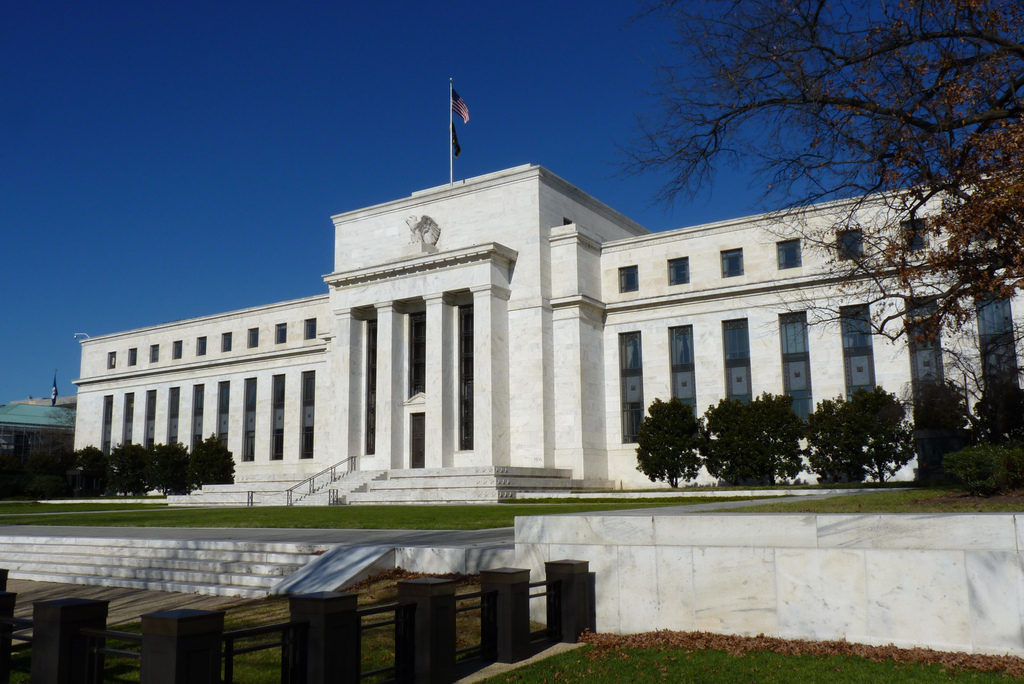The Federal Reserve may be walking back its plan of accelerating the pace of interest rate hikes after political and financial duress encompasses Argentina, Italy, and Turkey and the U.S. levees tariffs on foreign competitors. Although the Fed as already marked three rate increases for 2018, investors and analysts say it is now “highly unlikely” the U.S. central bank will look at raising it a fourth time.
In a report from the Wall Street Journal, top investors still see a 70 percent chance of the Fed going through with its three original increases, but are skeptical of a fourth increase amid evidence of stronger inflation and U.S. economic growth.
Data from financial investing firm CME Group says that markets are now running on a figure of 24 percent that the Fed will raise its rates this year. The prediction is down from 50 percent just one week ago, causing investors to bank on a more accommodative stance from the Fed.
In Europe, anti-EU political parties have the upper hand in Italy and are seen as the main factor in the less-than-stellar outlook, all which could strengthen volatility across emerging markets. This is spurred on by Italian President Sergio Mattarella attempting to avert holding a new general election in the country after a March vote failed to produce a conclusive result, thus causing political turmoil.
Marshall Gittler, chief strategist at ACLS Global, commented on the situation with, “5 Star Movement’s leader, Luigi Di Maio, appears willing to nominate a finance minister who won’t try to take Italy out of the euro,” according to MarketWatch.
As well, Turkey’s currency, the lira, is down 17 percent against the U.S. dollar, causing panic among global investors as many banks have borrowed money from Turkish companies.
Some European banks fear the falling lira could crash, sparking a financial crisis that would mirror that of the early 2000s. Express UK reports that, “every one percent the lira loses, the dollar debt automatically rises, meaning the first Turkish companies can no longer meet their financial obligations and have had to restructure their loans.”
Argentina is witnessing a similar situation in South America. Over the past six weeks, Argentinian currency, the peso, has lost 12 percent against the dollar. In response to dismay the panic of investors selling pesos for dollars, the country’s central bank hiked interest rates from 27.25 percent to 40 percent.
The Washington Post reports that Argentinian President Mauricio Macri, who took office in the latter half of 2015, inherited a legacy of economic mismanagement as his predecessor, Cristina Fernández de Kirchner, who derailed the economy with national subsides, price controls, and “easy money.” Over a decade of progressive economic policies, high inflation, and rampant unemployment have skyrocketed budget deficits, leading some to say it is reminiscent of their government debt default in 2001.
Nevertheless, not all market caution is set on foreign nations. President Donald Trump announced this morning that that his administration would impose tariffs on steel and aluminum imports from Europe, Mexico, and Canada. Commerce Secretary Wilbur Ross states that tariffs would be 25 percent on steel and 10 percent on aluminum.
Ross said that talks with Canada and Mexico over revising the North American Free Trade Agreement (NAFTA) were, “taking longer than we had hoped.” Talks with Europe had, “made some progress,” he said, but not enough for additional exemptions from duties.
AP reports that the decision could provoke retaliatory penalties and exacerbate trans-Atlantic and North American trade tensions.
With the Fed, there is precedent for holding back on hiking interest rates in past periods of market volatility. In 2015, the central bank delayed plans for raising rates after a slowdown in Chinese growth spooked companies and financial markets around the world. In 2016, the central bank only raised rates once – after predicting four raises that year – as investors were concerned over the impact of tighter U.S. economic policy on emerging markets and the U.K. Brexit vote.
Paul Ashworth, chief U.S. economist at Capital Economics, said it could be too early to expect a course change by the Fed. He believes the bank will deliver four rate increases this year as long as, “the Italian situation doesn’t descend into a full-blown crisis and…President Trump’s protectionist bark once again proves to be worse than his bite.”

